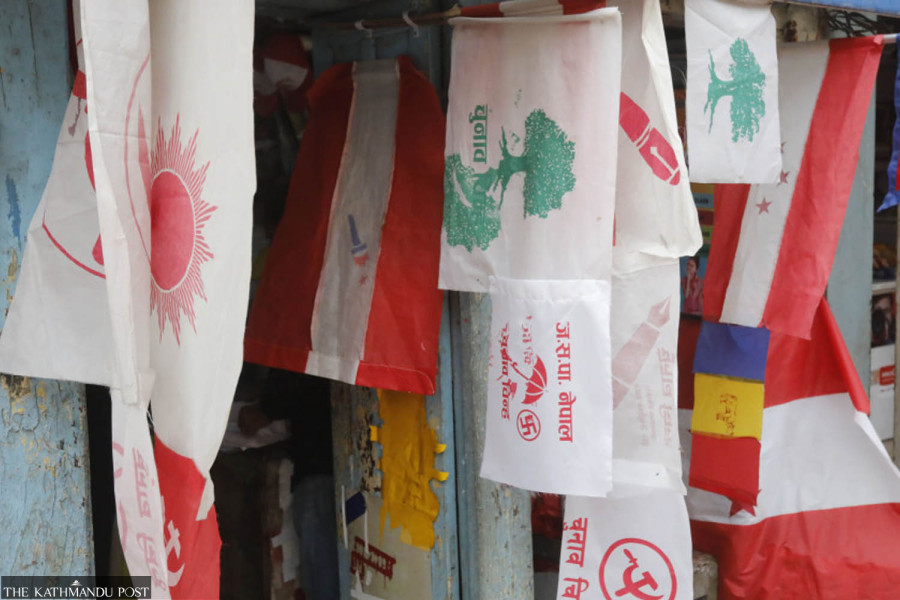National
Candidates start electioneering in blatant disregard of poll code
As per the Election Commission’s code of conduct, campaigning is allowed only from November 3.
Binod Ghimire
On August 28, the Election Commission published its code of conduct in the Nepal Gazette with a provision that the candidates for the House of Representatives and provincial assembly elections can start their publicity campaigns only 17 days prior to the voting date.
Clause 13 (1Y) of the code of conduct states that candidates can do the following for their publicity from 17 days prior to the polling day after the final list of candidates is made public: 1. Marches, mass gatherings, corner gatherings; 2. Broadcasting or publishing any publicity materials in the media; and 3. Door-to-door campaigns.
As per the code of conduct, the candidates for the November 20 polls have to wait until November 3 to start their formal campaigns to woo voters. The code of conduct has been in force since September 28. However, contrary to the provision, candidates have already started canvassing for votes.
“We have received reports from various districts saying publicity campaigns have begun across the country,” Pradip Pokharel, chairperson of the Election Observation Committee Nepal, told the Post. “This is against the election code of conduct, but the Election Commission is yet to initiate any action.”
As many as 2,526 candidates have registered their candidacies for the 165 first-past-the-post (FPTP) seats of the House of Representatives while 3,476 party leaders and independents are contesting the 330 provincial assembly seats. The number of candidates, however, can decrease as the commission can cancel the candidacies of those not qualified to fight the elections, and there are chances that some could withdraw from the race.
Even as the final list of candidates is being published only on Wednesday, election campaigns have begun from the very next day of candidacy filing, according to observers. The Election Commission had asked candidates to file their nominations on Sunday.
Posting a video clip of his campaign on Facebook, Ramhari Khatiwada, the Nepali Congress candidate in Okhaldhunga for the lower house, announced that he started campaigning from Tuesday. “We have started an election campaign from Rampur, the land of martyrs,” Khatiwada is seen saying while addressing a campaign rally in his constituency.
Rabindra Mishra, a Rastriya Prajatantra Party (RPP) candidate for the House of Representatives from Kathmandu-1, too has started a door-to-door campaign. In a video clip posted on Twitter, he is seen assuring the landless people in the constituency that he would raise their voice in Parliament if he gets elected.
Rekha Thapa, a popular actress and an RPP candidate from Morang-3, too has started a full-fledged campaign in her constituency. Several video clips of her campaign have been posted on her official Facebook page.
A senior CPN-UML leader from Province 1, who is contesting for the lower house, told the Post that he was too busy in a publicity campaign. “I am busy meeting voters in my constituency,” he told the Post, requesting anonymity.
Pokharel, whose organisation is observing the elections in most districts across the country, says candidates of all parties as well as independents have already started campaigning—and the commission has been no more than a spectator.
“For instance, the Congress candidate from Morang-2, Sujata Koirala, started campaigning even before registering her candidacy,” he said. “There is no point in enforcing a code of conduct that cannot be implemented. Along with the commission, it is also the responsibility of the political parties to foster a culture of accountability by following the rules.”
The commission has the authority to book the candidates who violate the code of conduct. Clause 46(1) of the code says that those violating it can be subjected to a fine of Rs100,000 or cancellation of their candidacies as per the Election Commission Act.
Some party leaders complain that the election schedule is impractical. They say it is not possible to stop campaigning once candidates are confirmed. “We registered our candidates on Sunday [October 9]. And we have to wait for three weeks to start our campaigns as per the code of conduct,” a House candidate from Dang-1 told the Post. “Do you think this is practical?”
The commission argues that the campaign period was limited to 17 days in consultation with the political parties, in an attempt to control overspending on the campaign trail. As the 48 hours before the election day are observed as the silent period, the parties can effectively campaign just for 15 days.
“The commission hasn’t barred parties from holding meetings and consultations. And we can’t stop door-to-door campaigns because the candidates claim they were not election campaigns but consultations,” Dinesh Thapaliya, chief election commissioner, told the Post. “However, we are conducting strict monitoring of party activities to stop campaign marches and rallies until November 3.”




 8.79°C Kathmandu
8.79°C Kathmandu















